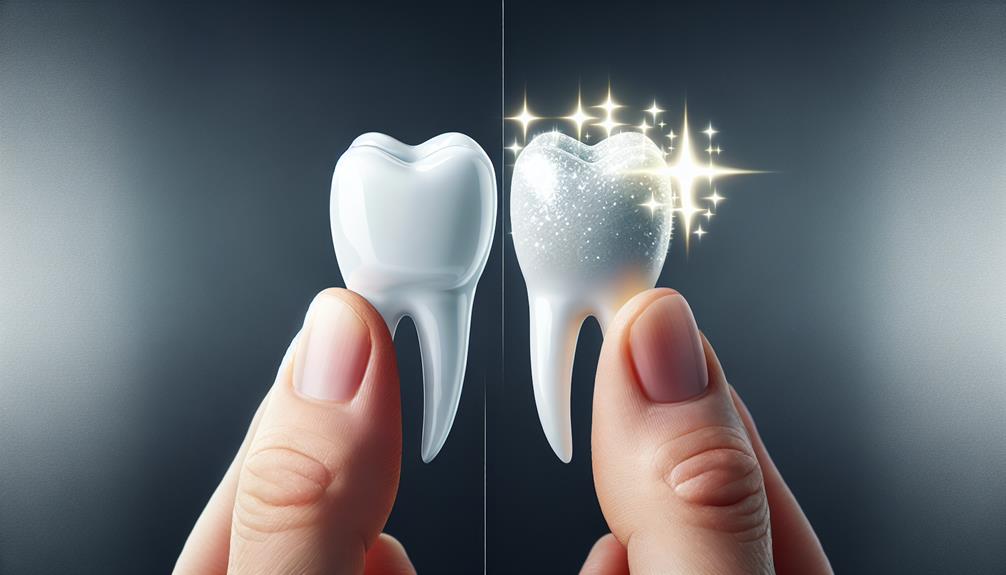To naturally whiten stained teeth, consider incorporating oil pulling, which can improve oral health and potentially whiten teeth. Baking soda is a gentle abrasive that can help remove surface stains while maintaining mouth pH balance. Apple cider vinegar's antibacterial properties fight harmful bacteria and can enhance oral health. Activated charcoal absorbs stains but consult your dentist first. Hydrogen peroxide effectively removes surface stains when used in moderation. These are just a few natural ways to whiten teeth, each with unique benefits for achieving a brighter smile.
Key Points
- Oil pulling improves oral health and potentially whitens teeth.
- Baking soda maintains pH balance and gently removes surface stains.
- Apple cider vinegar fights bacteria, removes stains, and strengthens enamel.
- Activated charcoal absorbs stains but consult a dentist due to possible color alteration.
- Hydrogen peroxide breaks down stains effectively with moderation and guidance.
Oil Pulling
To naturally whiten stained teeth, consider incorporating oil pulling into your oral hygiene routine. Oil pulling is an ancient practice rooted in Ayurvedic medicine that involves swishing oil around in your mouth to improve oral health. This technique is believed to help remove bacteria, promote gum health, and potentially whiten teeth.
When it comes to dental benefits, oil pulling can be a valuable addition to your oral hygiene regimen. Research suggests that oil pulling may reduce harmful bacteria in the mouth, which can lead to improved overall oral health. By swishing oil around in your mouth, you can potentially decrease the plaque buildup, which may contribute to stained teeth.
In terms of oral hygiene, oil pulling is a technique worth considering. While it shouldn't replace regular brushing and flossing, incorporating oil pulling into your routine can be a beneficial supplementary practice. Remember to use high-quality oils like coconut or sesame oil and swish for about 15-20 minutes for the best results.
Baking Soda
Consider using baking soda as a natural and effective method for whitening stained teeth. Baking soda, also known as sodium bicarbonate, can help improve the appearance of your teeth by gently removing surface stains. Here are some key reasons why baking soda is a popular choice for teeth whitening:
- Maintains pH equilibrium: Baking soda has alkaline properties that can help balance the pH levels in your mouth, creating an environment less conducive to the growth of bacteria that can cause staining.
- Thorough abrasive action: Its mild abrasive texture can aid in scrubbing away surface stains without causing damage to the enamel.
- Enamel safeguard: Baking soda's gentle cleansing action can help protect the enamel of your teeth while effectively removing stains.
- Freshens breath: Baking soda can also help neutralize odors and freshen your breath, giving you an added benefit alongside teeth whitening.
When used in moderation and as part of a holistic oral care routine, baking soda can be a safe and effective natural remedy for achieving a brighter smile.
Apple Cider Vinegar
Apple cider vinegar (ACV) is a popular natural remedy that may offer benefits for whitening stained teeth.
You might be interested in learning how to use ACV safely and effectively for oral care.
Be mindful of any potential risks and precautions associated with using apple cider vinegar for teeth whitening purposes.
ACV Benefits for Teeth
Benefit your teeth with the natural properties of Apple Cider Vinegar (ACV). ACV benefits for teeth include:
- Antibacterial Properties: ACV can help fight harmful bacteria in the mouth.
- Acidic Nature: The acidity of ACV may assist in removing surface stains on teeth.
- pH Balance: It aids in balancing the pH levels in the mouth, promoting oral health.
- Enamel Protection: Some studies suggest that ACV could contribute to strengthening tooth enamel.
How to Use
To utilize the benefits of Apple Cider Vinegar for your teeth, incorporate it into your oral care routine safely and effectively.
When using ACV as a natural remedy for teeth whitening, dilute it with water to reduce its acidity, which can be harmful to tooth enamel. Mix one part apple cider vinegar with two parts water, and swish this solution around in your mouth for about one minute. Be cautious not to use undiluted ACV, as it may cause damage to your teeth.
After rinsing with the ACV solution, brush your teeth thoroughly with regular toothpaste to remove any residual acid and prevent potential enamel erosion.
Incorporating this technique into your oral hygiene regimen can help you achieve a brighter smile naturally.
Risks and Precautions
Given the potential risks and precautions associated with the use of apple cider vinegar for teeth whitening, it's important to dilute the solution appropriately to protect your enamel. Apple cider vinegar, although known for its natural remedies, can pose risks if not used cautiously. Here are some precautions to take into account:
- Proper Dilution: Guarantee to dilute apple cider vinegar to avoid its acidic nature harming your enamel.
- Limit Exposure: Don't use apple cider vinegar for an extended period as it may erode the enamel.
- Rinse Thoroughly: After using apple cider vinegar, rinse your mouth thoroughly with water to remove any residue.
- Consult a Professional: If you experience any discomfort or pain, consult your dentist promptly to avoid potential complications.
Activated Charcoal
Activated charcoal, a popular natural remedy for teeth whitening, is known for its ability to absorb and remove surface stains on teeth. This black powder is highly porous and can bind to substances, including plaque and stains, helping to lift them from the teeth's surface.
When using activated charcoal for teeth whitening, it's often mixed with water to create a paste that's gently brushed onto the teeth. Due to its abrasive nature, it's important to be cautious with its application frequency to prevent enamel erosion.
While activated charcoal can be effective in removing surface stains, it may not alter the natural color of your teeth or address deeper discoloration issues. This method falls under the category of DIY toothpaste and natural remedies, making it a popular choice for those seeking alternative ways to whiten their teeth.
Remember to consult with your dentist before using activated charcoal to make sure it's suitable for your dental health needs.
Hydrogen Peroxide
When using hydrogen peroxide for teeth whitening, it's important to adhere to safe usage tips such as diluting the solution properly.
Be aware of potential side effects like tooth sensitivity and gum irritation that may occur with improper use.
Understanding the effectiveness of hydrogen peroxide on different types of stains can help you determine if it's the right natural whitening method for you.
Safe Usage Tips
For safe usage of hydrogen peroxide in whitening stained teeth naturally, it's essential to follow recommended guidelines and precautions. When using hydrogen peroxide for teeth whitening, consider the following tips:
- Dilution: Always dilute hydrogen peroxide with water to reduce its concentration and minimize the risk of irritation.
- Duration of Application: Limit the duration of hydrogen peroxide application on your teeth to the recommended time to prevent sensitivity.
- Frequency: Avoid using hydrogen peroxide too frequently as it may lead to enamel damage and increased tooth sensitivity.
- Rinse Thoroughly: After whitening with hydrogen peroxide, make sure to rinse your mouth thoroughly to remove any residual solution.
Following these tips can help you achieve a brighter smile while minimizing potential risks.
Potential Side Effects
To minimize the risk of potential side effects from hydrogen peroxide, it's essential to adhere to safe usage practices and guidelines for whitening stained teeth naturally. While hydrogen peroxide is commonly used in natural remedies for teeth whitening, it's important to be aware of potential oral health risks associated with its use.
Excessive or improper application of hydrogen peroxide can lead to tooth sensitivity, gum irritation, and even damage to the enamel. It's recommended to consult with a dentist before using hydrogen peroxide for teeth whitening to confirm it's safe for your oral health.
Effectiveness on Stains
Taking into account the potential risks of using hydrogen peroxide for teeth whitening, understanding its effectiveness on stains is important for achieving desired results while maintaining oral health. Hydrogen peroxide is a common ingredient in many natural remedies and DIY solutions for teeth whitening. Here are some key points to bear in mind:
- Hydrogen peroxide is effective in breaking down stains on the surface of the teeth.
- It can penetrate the enamel to target deeper stains, providing a more thorough whitening effect.
- The bubbling action of hydrogen peroxide helps to lift and remove surface stains effectively.
- When used in moderation and with proper guidance, hydrogen peroxide can be a safe and powerful tool for whitening stained teeth naturally.
Coconut Oil
Using coconut oil for whitening stained teeth is a natural and effective method backed by anecdotal evidence and some scientific studies. The benefits of coconut oil, particularly its antimicrobial properties, make it a popular choice for oral health.
One common technique for utilizing coconut oil is oil pulling, where you swish a tablespoon of coconut oil in your mouth for around 15-20 minutes, allowing it to interact with the bacteria and plaque on your teeth. This process is believed to help remove surface stains and promote overall oral hygiene.
Coconut oil contains lauric acid, which has been shown to have antimicrobial properties that can potentially reduce the levels of bacteria in the mouth. While more research is needed to fully understand the extent of coconut oil's whitening effects, many people have reported positive results after incorporating oil pulling into their oral care routine.
Incorporating coconut oil into your oral hygiene regimen as a natural teeth whitening method may offer a gentle and chemical-free approach to brightening your smile.
Strawberries
If you're looking for natural ways to brighten your smile, consider utilizing the power of strawberries.
Strawberry pulp can be directly applied to your teeth to help remove surface stains and brighten your smile.
Additionally, mixing mashed strawberries with baking soda can create a gentle yet effective whitening paste to improve the appearance of your teeth.
Strawberry Pulp Application
To naturally whiten stained teeth, incorporating strawberry pulp application can be an effective method due to its natural bleaching properties. Strawberry pulp benefits include containing malic acid, which acts as a natural astringent to remove surface tooth discoloration.
Additionally, the vitamin C in strawberries helps to break down plaque that can make teeth appear yellow. The ellagitannins present in strawberries may also reduce staining caused by coffee or red wine.
Moreover, the gentle abrasiveness of the seeds in the pulp can help scrub away surface stains, revealing a brighter smile. Try mashing up fresh strawberries and applying the pulp directly to your teeth for a few minutes before rinsing to take advantage of this natural teeth whitening hack.
Strawberry and Baking Soda
Incorporating baking soda with strawberries can further enhance the teeth whitening effects due to their combined natural bleaching properties. Strawberries contain malic acid, a natural astringent that helps remove surface tooth discoloration. This, combined with the abrasive texture of baking soda, can gently scrub away stains on the teeth's surface.
Additionally, strawberries are rich in vitamin C, which can help break down plaque that causes teeth to look yellow. The antioxidants present in strawberries also benefit gum health.
To use this natural remedy, mash a ripe strawberry and mix it with a small amount of baking soda to form a paste. Apply the paste to your teeth, leave it on for a few minutes, then rinse thoroughly. Remember, consistency is key when using natural remedies for teeth whitening.
Turmeric
Enhance your oral health with the natural whitening properties of turmeric. Turmeric benefits oral health in several ways, making it a popular choice for those looking to brighten their smile naturally. Here are some DIY recipes and tips for incorporating turmeric into your oral care routine:
- Turmeric Paste: Create a paste by mixing turmeric powder with water or coconut oil. Apply this paste to your teeth and leave it on for a few minutes before rinsing thoroughly.
- Turmeric and Salt Scrub: Combine turmeric with a pinch of salt to create an exfoliating scrub. Gently massage this mixture onto your teeth to help remove surface stains.
- Turmeric Mouthwash: Add a dash of turmeric powder to warm water and use it as a mouthwash. Swish the solution around your mouth for a minute or two before spitting it out.
- Turmeric Toothpaste: Mix turmeric powder with baking soda and coconut oil to create a homemade toothpaste. Brush your teeth with this paste regularly to help whiten your teeth naturally.
Lemon Juice
Whiten your teeth naturally by exploring the potential of lemon juice, a common household ingredient known for its acidic properties that can aid in teeth whitening.
Lemon juice is often recommended as a natural remedy for teeth whitening due to its bleaching effect. The citric acid in lemon juice can help eliminate stains from the teeth's surface, making them appear brighter.
DIY treatments using lemon juice usually involve mixing it with water to dilute the acidity and then applying the solution to the teeth using a clean cloth or swab. However, it's important to use this method sparingly as excessive use of lemon juice can erode tooth enamel over time due to its acidic nature.
To minimize potential damage, rinse your mouth thoroughly with water after using lemon juice on your teeth. While lemon juice can be a cost-effective way to whiten teeth at home, it's vital to proceed with caution and consult a dentist if you have any concerns about its effects on your oral health.
Orange Peel
Utilize the natural benefits of orange peel to help brighten your smile and combat teeth discoloration. Orange peel is a fantastic natural remedy that can assist in whitening stained teeth effectively. Here are some ways you can make the most of orange peel for your oral care routine:
- Abrasive Properties: The slightly abrasive texture of orange peel can help scrub away surface stains on your teeth.
- Vitamin C Content: Orange peel is rich in vitamin C, which can promote gum health and aid in removing plaque buildup.
- Antibacterial Qualities: The natural oils present in orange peel have antibacterial properties that can help fight against bacteria in the mouth.
- Fresh Breath: Using orange peel can also contribute to fresher breath due to its pleasant citrus aroma.
Incorporating orange peel into your dental care regimen can be a simple yet effective way to brighten your smile naturally. Remember to brush your teeth afterward to remove any residual sugars from the orange peel.
Frequently Asked Questions
Are There Any Risks or Side Effects Associated With Using Activated Charcoal to Whiten Stained Teeth?
When using activated charcoal to whiten teeth, potential risks like enamel erosion may arise. However, benefits include its ability to remove surface stains effectively. Safety concerns are important to take into account to balance its effectiveness for a brighter smile.
Can Using Hydrogen Peroxide to Whiten Teeth Cause Sensitivity or Damage to the Enamel?
Using hydrogen peroxide to whiten teeth can lead to sensitivity and enamel damage. To protect enamel and prevent sensitivity, consider natural alternatives for tooth health. Prioritize gentle methods to maintain a healthy smile long-term.
How Often Should Coconut Oil Pulling Be Done in Order to See Noticeable Results in Teeth Whitening?
To see noticeable results in teeth whitening with coconut oil pulling, consider doing it 3-4 times a week. Coconut oil benefits oral health, but results vary. Remember, natural alternatives like oil pulling complement but may not replace professional treatments for significant whitening.
Are There Any Specific Types of Strawberries That Are More Effective for Whitening Teeth?
When considering strawberry varieties for teeth whitening, remember that all types contain malic acid which can help brighten your smile. Opt for fresh and ripe strawberries as they are most effective in providing a natural alternative for teeth whitening.
Is It Safe to Use Turmeric as a Teeth Whitening Remedy for People With Sensitive Teeth or Gums?
Using turmeric for teeth whitening can benefit some, but sensitive teeth or gums require precautions. Turmeric toothpaste effectiveness varies; consult your dentist before use. Consider possible risks and individual suitability before trying.



